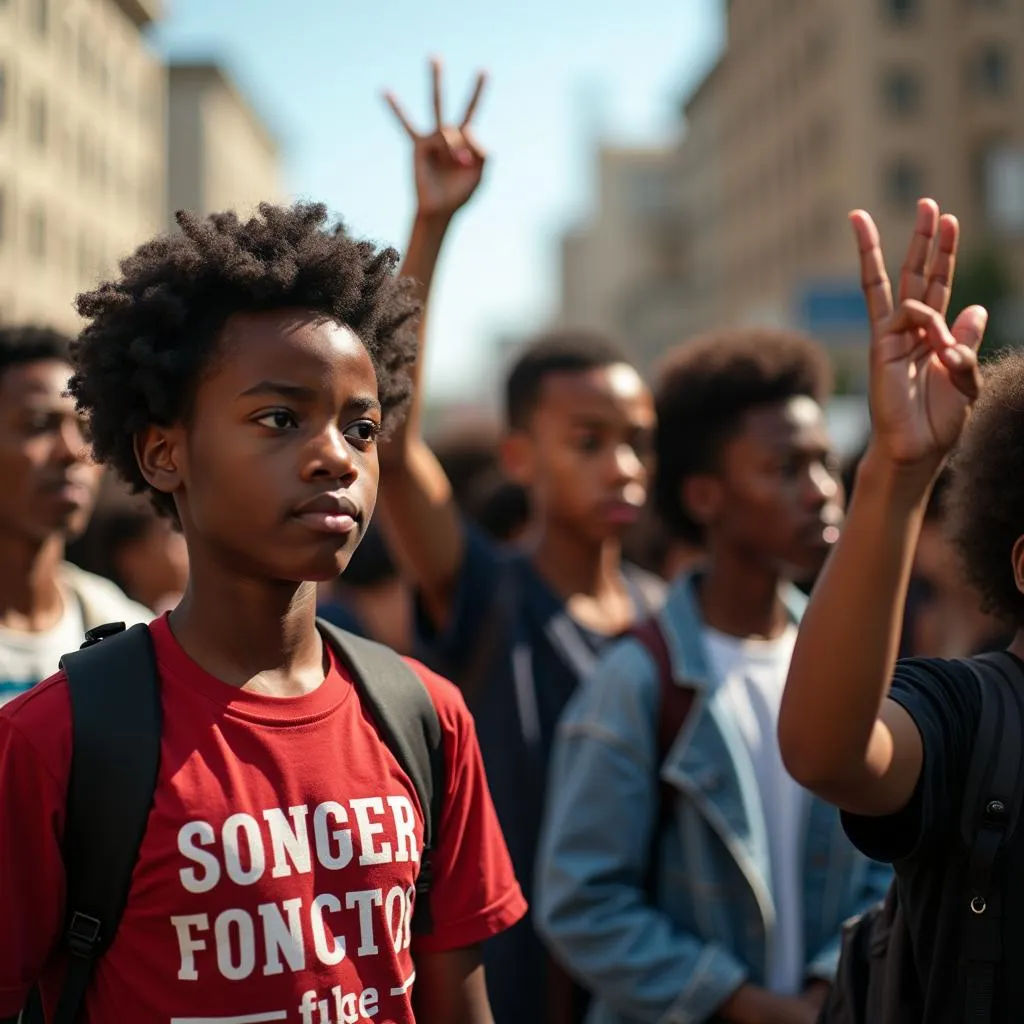Understanding African American Identity
African American Identity is a complex and multifaceted concept, shaped by a unique history, cultural heritage, and ongoing social and political realities. It’s about more than just skin color; it encompasses a shared experience of ancestry, heritage, and a continuous struggle for equality and recognition in the United States.
 African American Family Celebrating Juneteenth
African American Family Celebrating Juneteenth
The Roots of African American Identity
The story begins with the transatlantic slave trade, a dark chapter in human history that forcibly brought millions of Africans to America. Stripped of their names, languages, and cultures, these individuals were thrust into a system designed to dehumanize and exploit them. Yet, even under the brutal conditions of slavery, African cultural practices, traditions, and spiritual beliefs survived, laying the foundation for a distinct African American identity.
This identity was forged in resistance to oppression. From slave revolts to the Underground Railroad, African Americans continuously fought for their freedom and challenged the racist ideologies that sought to define them. The Civil War marked a turning point, leading to the abolition of slavery, but the struggle for equal rights and social justice was far from over.
Shaping Identity: From Reconstruction to the Civil Rights Movement
The Reconstruction era following the Civil War saw African Americans actively participating in rebuilding the nation, establishing their own institutions, and fighting for political representation. However, the rise of Jim Crow laws in the late 19th century ushered in a new era of segregation and discrimination, once again challenging the quest for equality.
Through these turbulent times, African American identity continued to evolve. Artistic movements like the Harlem Renaissance flourished, celebrating Black culture, creativity, and resilience. Music, particularly jazz and blues, emerged as powerful forms of expression, reflecting the joys, sorrows, and struggles of the community.
The Civil Rights Movement of the mid-20th century marked another pivotal chapter. Leaders like Martin Luther King Jr., Malcolm X, and Rosa Parks galvanized the nation with their calls for justice and equality. The movement led to significant legal victories, dismantling segregation and securing voting rights for African Americans.
Navigating Identity in the 21st Century
Today, African American identity continues to be shaped by ongoing dialogues about race, representation, and equality in America. The Black Lives Matter movement, sparked by the tragic deaths of numerous African Americans at the hands of law enforcement, has brought renewed attention to systemic racism and police brutality.
 African American Students Protesting for Social Justice
African American Students Protesting for Social Justice
Despite the challenges, African American culture thrives in music, literature, film, fashion, and various other fields. The richness and diversity within the African American community are reflected in its many voices and experiences. The ongoing conversation about identity acknowledges the impact of historical injustices while celebrating the resilience, creativity, and contributions of African Americans to the fabric of American society.
FAQs About African American Identity
-
What is the difference between “African American” and “Black”? Both terms are used to refer to people of African descent in the United States. “African American” emphasizes the dual heritage of being both African and American, while “Black” is often used as a broader racial category.
-
Is there a singular African American experience? No, there are diverse experiences within the African American community based on factors like region, socioeconomic status, gender, and sexual orientation.
-
How has African American identity been portrayed in media? Representation in media has historically been fraught with stereotypes and misrepresentations. However, there’s been a push for more nuanced and authentic portrayals of African American characters and stories in recent years.
-
How can I be a better ally to the African American community? Educate yourself about the history of racism and oppression, listen to and amplify Black voices, and actively challenge racist attitudes and behaviors.
Seeking Further Understanding
To delve deeper into the complexities of African American identity, explore these resources on Omenka Mag:
- African American People in USA Justice System
- African American Names and Surnames
- 80’s Hip Hop Urban Men African American
- African American vs Black
- African American Fiction
These articles offer diverse perspectives on the historical, cultural, and social dimensions of African American identity.
Connect with Us
For further inquiries or assistance, reach out to our dedicated team:
Phone: +255768904061
Email: [email protected]
Address: Mbarali DC Mawindi, Kangaga, Tanzania
Our customer support is available 24/7 to assist you.

